Welcome to the unit
译林版英语八年级上册unit1-unit4必备句子

Unit1 Welcome to the unit1.我能喝点什么吗?Can I have something to drink?2.也许我能分享它。
Maybe we can share it.3.什么样的人适合做好朋友呢?What makes good friends?4.好,朋友应该是诚实的。
Well, good friends should be honest.5.你可以信任他们,因为他们从不说谎。
You can trust them because they never tell lies. Reading11.她还乐于助人,在任何时候都愿意帮助别人。
She is also helpful and ready to help people any time.2.她想长大后当一名歌手。
She wants to be a singer when she grows up.3.他讲好玩的笑话并总是使我大笑。
He tells funny jokes and always makes me laugh.4.和他在一起我从不感到无聊。
I never feel bored with him.5.它们在他的课桌下伸不开。
They do not fit well under his desk.Reading21.人人认为她漂亮。
Everyone thinks she is pretty.2.她经常微笑,而且从不说任何人一句坏话。
She smiles often and never says a bad word about anyone.3.当有事使我发愁时,我总是可以去找她。
When something worries me, I can always go to her.4.我能告诉她任何事因为她能保密。
I can tell her anything because she can keep a secret.5.你会选择谁作为你最好的朋友?Who would you choose as your best friend?Grammar1.她比我矮。
《Welcome to the unit 》 教学设计
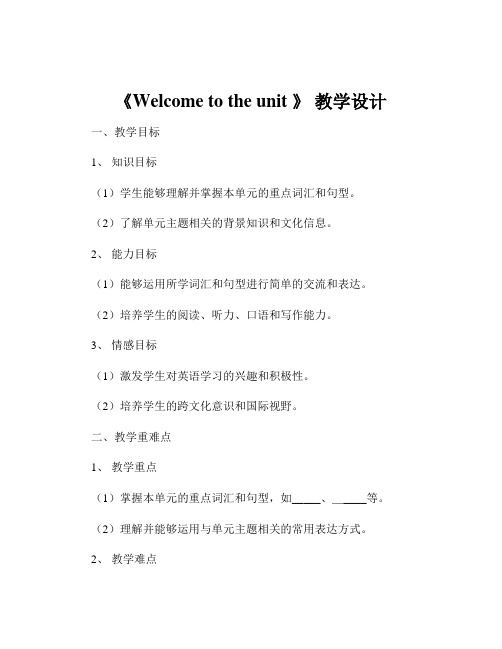
《Welcome to the unit 》教学设计一、教学目标1、知识目标(1)学生能够理解并掌握本单元的重点词汇和句型。
(2)了解单元主题相关的背景知识和文化信息。
2、能力目标(1)能够运用所学词汇和句型进行简单的交流和表达。
(2)培养学生的阅读、听力、口语和写作能力。
3、情感目标(1)激发学生对英语学习的兴趣和积极性。
(2)培养学生的跨文化意识和国际视野。
二、教学重难点1、教学重点(1)掌握本单元的重点词汇和句型,如_____、_____等。
(2)理解并能够运用与单元主题相关的常用表达方式。
2、教学难点(1)如何引导学生正确运用所学词汇和句型进行有效的交流。
(2)帮助学生克服在语言表达中可能出现的语法错误和发音问题。
三、教学方法1、情景教学法通过创设生动的情景,让学生在实际情境中感受和运用语言,提高语言的实际运用能力。
2、任务驱动法布置各种任务,如小组讨论、角色扮演、写作练习等,让学生在完成任务的过程中掌握知识和技能。
3、互动教学法鼓励学生积极参与课堂互动,提问、回答、讨论,培养学生的思维能力和口语表达能力。
四、教学过程1、导入(5 分钟)通过播放一段与单元主题相关的视频或展示一些图片,引起学生的兴趣,然后提问学生对所展示内容的看法和感受,从而引出本单元的主题。
2、词汇学习(10 分钟)(1)展示本单元的重点词汇,通过图片、例句、实物等方式帮助学生理解词汇的含义和用法。
(2)让学生跟读词汇,纠正发音,然后进行简单的词汇练习,如拼写、填空、造句等。
3、句型学习(10 分钟)(1)讲解本单元的重点句型,分析句型结构和语法要点。
(2)让学生模仿句型进行造句练习,教师给予及时的反馈和指导。
4、阅读与听力训练(15 分钟)(1)让学生阅读一篇与单元主题相关的短文,然后回答一些问题,检查学生对文章的理解。
(2)播放一段与短文相关的听力材料,让学生边听边做笔记,然后完成听力练习。
5、口语表达(15 分钟)(1)组织学生进行小组讨论,围绕单元主题展开交流,鼓励学生运用所学词汇和句型表达自己的观点和想法。
Unit 2 Welcome to the unit课件-高中英语牛津译林版(2020)必修第二册
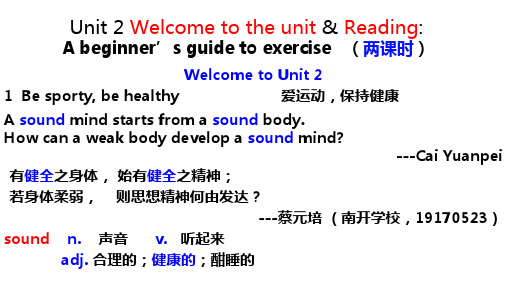
Foods like noodles, rice,fruit and vegetables give your body plenty of carbohydratesto keep up your energy.
After exercise,you need to eat foods rich in protein such as fish, eggs and milk products.
How can a weak body develop a sound mind?
---Cai Yuanpei
有健全之身体, 始有健全之精神;
若身体柔弱, 则思想精神何由发达?
---蔡元培 (南开学校,19170523)
sound n. 声音 v. 听起来
adj. 合理的;健康的;酣睡的
2 Q: What do soccer players and magicians have in common? A: Both do hat-tricks!
2 What do we know from
?
C
A physical activity can prevent heart and lungs working too hard.
B exercise is only good for physical health in the long term.
A Figuring out your expectations. B Having a physical examination
C Developing your physical health D Stretching your muscles A
4 Why does the author compare your body to a car? A
《Welcome to the unit》 说课稿
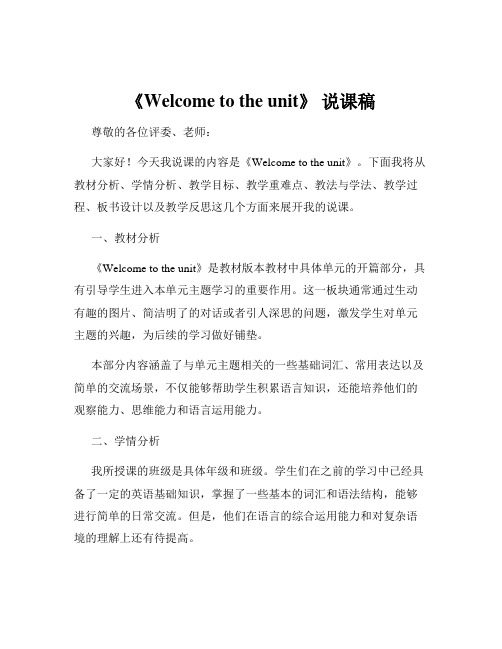
《Welcome to the unit》说课稿尊敬的各位评委、老师:大家好!今天我说课的内容是《Welcome to the unit》。
下面我将从教材分析、学情分析、教学目标、教学重难点、教法与学法、教学过程、板书设计以及教学反思这几个方面来展开我的说课。
一、教材分析《Welcome to the unit》是教材版本教材中具体单元的开篇部分,具有引导学生进入本单元主题学习的重要作用。
这一板块通常通过生动有趣的图片、简洁明了的对话或者引人深思的问题,激发学生对单元主题的兴趣,为后续的学习做好铺垫。
本部分内容涵盖了与单元主题相关的一些基础词汇、常用表达以及简单的交流场景,不仅能够帮助学生积累语言知识,还能培养他们的观察能力、思维能力和语言运用能力。
二、学情分析我所授课的班级是具体年级和班级。
学生们在之前的学习中已经具备了一定的英语基础知识,掌握了一些基本的词汇和语法结构,能够进行简单的日常交流。
但是,他们在语言的综合运用能力和对复杂语境的理解上还有待提高。
这个年龄段的学生思维活跃,好奇心强,对于新鲜事物充满兴趣。
在教学中,我们可以充分利用这一特点,创设丰富多样的教学情境,激发学生的学习积极性。
三、教学目标基于对教材和学情的分析,我将本节课的教学目标设定为以下三个方面:1、知识目标(1)学生能够理解并掌握本单元的重点词汇,如列举重点词汇。
(2)学生能够熟练运用与单元主题相关的常用表达,如列举常用表达。
2、技能目标(1)通过观察图片和阅读对话,培养学生的观察能力和阅读理解能力。
(2)通过小组讨论和角色扮演,提高学生的口语表达能力和合作交流能力。
3、情感目标(1)激发学生对英语学习的兴趣,增强学习的自信心。
(2)引导学生关注单元主题所涉及的相关话题,培养他们的跨文化意识和社会责任感。
四、教学重难点1、教学重点(1)掌握本单元的重点词汇和常用表达。
(2)理解并能够运用与单元主题相关的基本句型进行交流。
牛津译林版模块三unit1-Welcome-to-the-unit
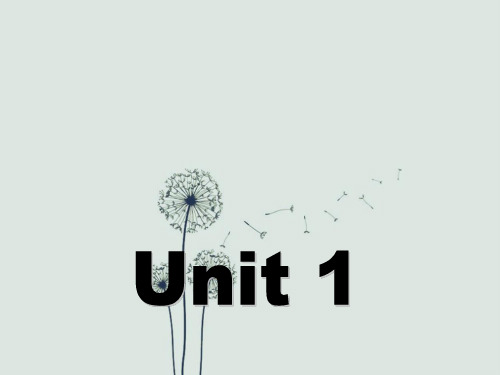
What do they have in common?
张海迪
Beethoven
They all made great achievements even if they lost some of their senses.
Fill in the blanks with words relative to senses. When he got there, he _n_o_t_ic_e_d_ that there was a dark hole. He _lo_o_k_e_d_ into it, but could ___s_e_e_ nothing. He _li_s_te_n_e_d_with his ears, he could ___h_e_a_r_ nothing, either.
If your nose is blocked from a cold, you may find the food is tasteless.
The senses of taste and smell are intimately linked to one another. Often the loss of one will result in the loss of the other.
2. Some people cannot remember something until they have seen it. Other people only need to hear something once or twice before they can remember it. Which sense helps you learn best? How does it help you?
9A Unit 1 (Welcome to the unit)

Welcome to the unit
centaur
ram
crab
lion
fish
bull
flask
Double boys
virgo
scale
scorpion
wether
1. Star signs星座 ★sign用作名词,意为“星座”。如: A year is divided into 12 different star signs. 一年被分为十二个星座。 ★sign用作名词,意为“记号”“符号”。如: “+ - × ÷”are all maths signs. “+ - × ÷”都是数学符号。 ★sign用在交通、饭店、商店等地方用来引起人们的注意或者提醒人们注意事 宜,所以常解释为“告示”、“交通牌示(限速、弯路等)”、“招牌”、“店 招”、“标牌”、“指示牌”。如: Can you see the traffic signs beside the road? 你看见路边的交通牌示了吗? ★sign也能作“手势”“信号”解。如: Of course we cannot understand the sign-language on TV. 当然我们不懂电视里 手语。 ★sign也可以作动词用,表示“签名,签字,签署”。如: Did she sign the letter yesterday? 昨天她在信上签名了吗? ★sign作动词用时,还表示“示意、打手势”的意义。如: After we said good morning to our English teacher, he signed us to sit down 我们向我们的英语老师问过好后,他示意我们坐下。 来。 ★bring用作动词时,有“提供”的意思。如:
【2024秋】最新版译林版七年级上册英语第二单元Unit2《单词+短语+句子》默写专项练习(含答案)
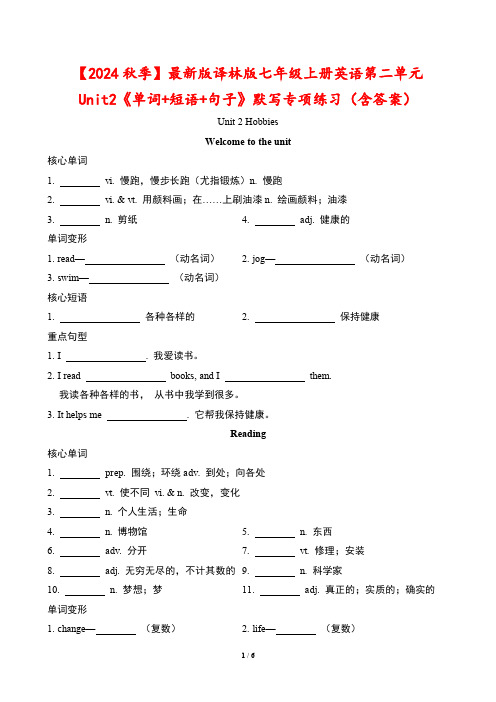
【2024秋季】最新版译林版七年级上册英语第二单元Unit2《单词+短语+句子》默写专项练习(含答案)Unit 2 HobbiesWelcome to the unit核心单词1. vi. 慢跑,慢步长跑(尤指锻炼)n. 慢跑2. vi. & vt. 用颜料画;在……上刷油漆n. 绘画颜料;油漆3. n. 剪纸4. adj. 健康的单词变形1. read—(动名词)2. jog—(动名词)3. swim—(动名词)核心短语1. 各种各样的2. 保持健康重点句型1. I . 我爱读书。
2. I read books, and I them.我读各种各样的书,从书中我学到很多。
3. It helps me . 它帮我保持健康。
Reading核心单词1. prep. 围绕;环绕adv. 到处;向各处2. vt. 使不同vi. & n. 改变,变化3. n. 个人生活;生命4. n. 博物馆5. n. 东西6. adv. 分开7. vt. 修理;安装8. adj. 无穷无尽的,不计其数的9. n. 科学家10. n. 梦想;梦11. adj. 真正的;实质的;确实的单词变形1. change—(复数)2. life—(复数)3. end—(形容词)4. science—(职业,名词)核心短语1. 拆卸,拆开(机器等)2. 空闲时间3. 去上网4. 变成现实5. 善于应付……重点句型1. He is .他是个科学迷。
2. He gets things and learns a lot.他可以见到各种各样的事物,学到许多知识。
3. Science !科学改变了我们的生活!4. At home, he likes to and learn .在家时,他喜欢把东西拆开,研究它们的工作原理。
5. He also to find answers .他还会上网为自己无穷无尽的问题寻找答案。
6. He one day.将来有一天他想成为一名科学家。
牛津译林版英语八年级英语上册 Unit5知识点梳理
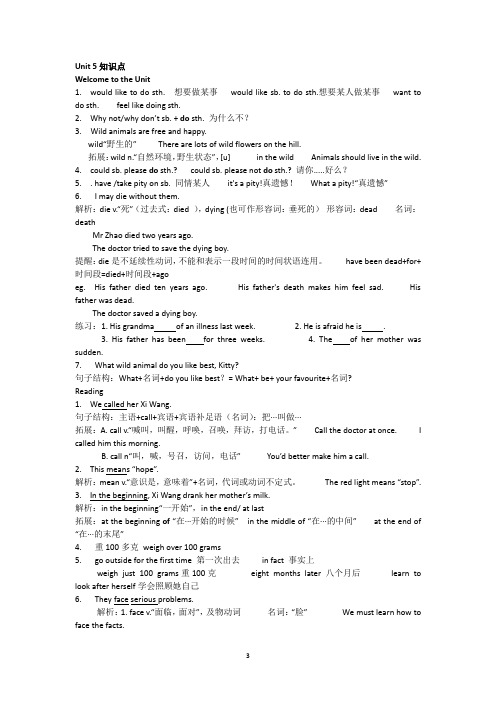
Unit 5知识点Welcome to the Unit1.would like to do sth. 想要做某事would like sb. to do sth.想要某人做某事want to do sth. feel like doing sth.2.Why not/why don’t sb. + do sth. 为什么不?3. Wild animals are free and happy.wild“野生的” There are lots of wild flowers on the hill.拓展:wild n.“自然环境,野生状态”,[u] in the wild Animals should live in the wild.4. could sb. please do sth.? could sb. please not do sth.? 请你.....好么?5. . have /take pity on sb. 同情某人it's a pity!真遗憾!What a pity!“真遗憾”6. I may die without them.解析:die v.“死”(过去式:died ),dying (也可作形容词:垂死的)形容词:dead 名词:deathMr Zhao died two years ago.The doctor tried to save the dying boy.提醒:die是不延续性动词,不能和表示一段时间的时间状语连用。
have been dead+for+时间段=died+时间段+agoeg. His father died ten years ago. His father's death makes him feel sad. His father was dead.The doctor saved a dying boy.练习:1. His grandma of an illness last week. 2. He is afraid he is .3. His father has been for three weeks.4. The of her mother was sudden.7. What wild animal do you like best, Kitty?句子结构:What+名词+do you like best?= What+ be+ your favourite+名词?Reading1.We called her Xi Wang.句子结构:主语+call+宾语+宾语补足语(名词):把···叫做···拓展:A. call v.“喊叫,叫醒,呼唤,召唤,拜访,打电话。
译林版高中英语必修一Unit4 Welcome to the unit 教案(雅礼)
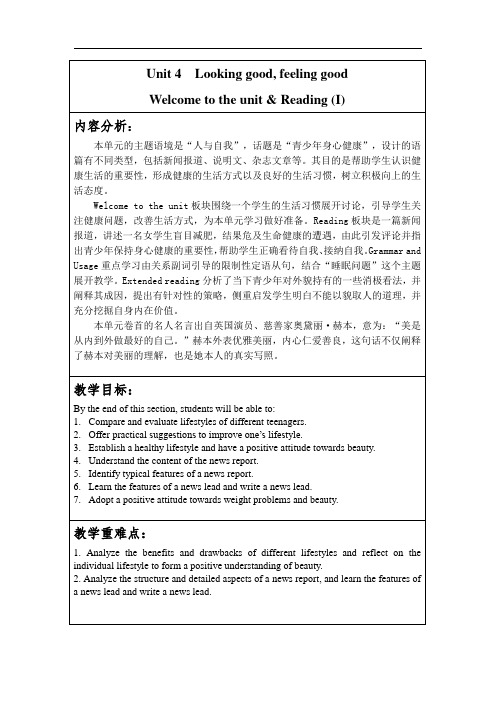
T asks Ss to predict some content of the reading.
【设计意图:预测课文内容,了解新闻的文体,为之后的阅读做好铺垫】
Step 5Fast reading
T asks Ss to listen to the news report and answer the following questions.
【设计意图:选择两个同学行为习惯中健康的生活习惯,并给出建议如何帮助他们养成良好的生活习惯。通过选择的讨论,引导学生客观分析不同生活习惯的利弊,并意识到身心健康发展的重要性,同时学习正确的提建议。】
Step 4 Predictingofthereading
1. What kind of writing is the reading according to the title and the first paragraph?
Headline,Lead, Body, Tail
【设计意图:学生认识和理解新闻文体的基本要素,了解各个新闻要素的内容和基本功能】
Step 8Understandinganews lead
1.T asks Ss:What information can readers learn from an effective lead?
Step2Appreciatingaquotation about beauty
T asks students to read aloud thequotationtogetherand asks them to express their own understanding of the quotation as well as their own interpretation of beauty.
译林牛津版英语模块八Unitwelcometotheunit教学课件

Common rules on writing a summary
1. Focus on main ideas and l_e_a_ve__o_u_t examples and details. •2. When using the words and phrases in the original passage, do not include your own opinion, but be sure to use your own words
Florence Chadwick
• 2.What did the woman attempt to do at age 34?
to become the first woman to swim from Catalina Island to the California coast.
• 3.Why did she fail in her first attempt but succeed in her second attempt ?
out the topic sentences ,key words and phrases.
2.Tense: use the tense based on the passage. 3.Rewrite: Write in our own words.
4.Join: In our final draft, insert transitional words
polish and perfect the writing.
The song reminds us that all of us should have confidence in ourselves, be ready to challenge ourselves, and have a good dream ,with which you can make everything possible.
牛津英语 七年级 下 Unit 1 Welcome to the unit 课件
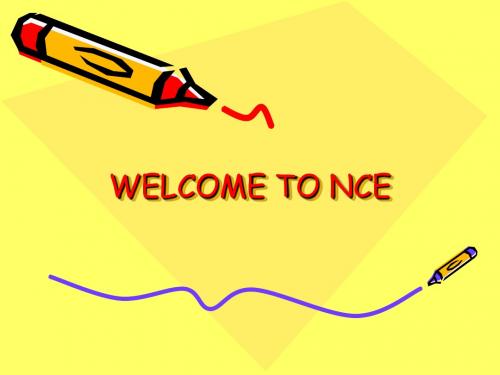
The UK
Russia
Red Square 红场
Discussion
• Suppose you have enough money and time, which country would you like to visit most? • Introduce the places of interest and the capital city of this country to your partner.
palace 宫殿
the Summer Palace 颐和园
Would like
some …
to do … 他想住在哪个首都?
Which capital would he like to live in?
再来些茶怎么样?
Would like some more tea?
the shopping mall next to my 他现在正坐在我旁边. school He is sitting next to me now.
1. 梦想家园
2. 住在宫殿里 3. 在餐厅隔壁
dream homes live in a palace next to a restaurant
4. 你最喜欢的是那个?
Which is your favourite? =Which do you like best?
5. 最大的一个
6. 在不同的国家 7. 国家的名字
无比较对象,very, quite, too 两者比较,than
Bill is the tallest in our class.
在我们之中,Peter是最胖的.
Peter is the fattest of us.
M4U2牛津英语-Welcome-to-the-unit
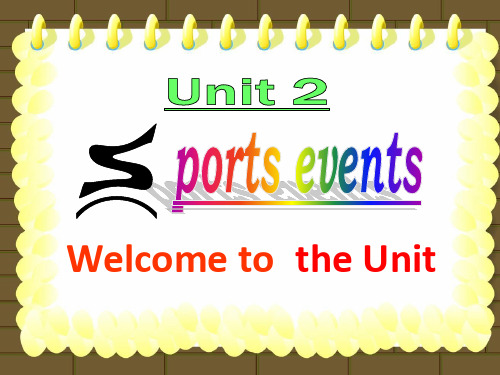
have to be _q_u_i_c_k_-m__in_d_e__d_
and have rapid responses. It is _a__g_o_o_d_w__a_y_ to make friends and meet new people.
long jump
high jump
running
horse-riding
volleyball
golf
Brainstorming
1. Do you like sports? 2. What sports do you know? 3. What is your favorite sport?
Why?
As students, we should do sports regularly in our s_p_a_r_e_ time, but we shall never let play a_f_f_e_ct__ our study.
P Related Readinok 3. Roman
Welcome to the Unit
Brainstorming
1. Do you like sports? 2. What sports do you know?
football tennis
basketball table tennis
baseball badminton
swimming
shooting
boxing
Boxing became an Olympic sport in 688BC and is still popular today.The __b_o_x_e_r
usHesohwis omr huerc_fhi_s_dt_sotoypounuchktnhoe owppaobneonut’st _h_e_a__d anbdo_b_xo_id_n_ygw?ith the aim to knock the opponent
【2024秋】最新版译林版七年级上册英语第三单元Unit3《单词+短语+句子》默写专项练习(含答案)
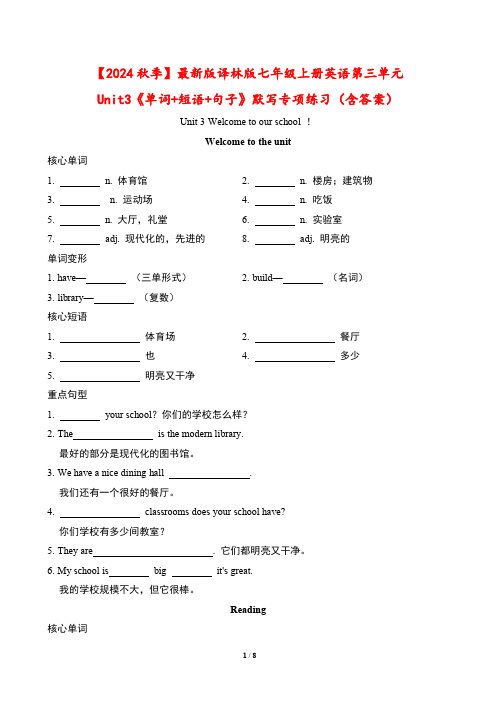
【2024秋季】最新版译林版七年级上册英语第三单元Unit3《单词+短语+句子》默写专项练习(含答案)Unit 3 Welcome to our school !Welcome to the unit核心单词1. n. 体育馆2. n. 楼房;建筑物3. n. 运动场4. n. 吃饭5. n. 大厅,礼堂6. n. 实验室7. adj. 现代化的,先进的8. adj. 明亮的单词变形1. have—(三单形式)2. build—(名词)3. library—(复数)核心短语1. 体育场2. 餐厅3. 也4. 多少5. 明亮又干净重点句型1. your school?你们的学校怎么样?2. The is the modern library.最好的部分是现代化的图书馆。
3. We have a nice dining hall .我们还有一个很好的餐厅。
4. classrooms does your school have?你们学校有多少间教室?5. They are. 它们都明亮又干净。
6. My school is big it's great.我的学校规模不大,但它很棒。
Reading核心单词1. pron. 每人,所有人,人人2. adj. 完美的3. vt. 度过,花(时间)vi. & vt. 花(钱)4. vi. & n. 闲聊5. adj. 令人激动的6. n. 布告板,告示牌7. n. 大门8. n. 新闻;消息9. n. 布告牌,木板10. prep. 例如;像11. vt. 相信12. det. & pron. 更多的,更大的adv. 更,更多13. adv. 很,十分,真正地14. adv. 很快,马上单词变形1. exciting—(形容词,激动的,兴奋的)2. match—(复数)3. students—(所有格形式)4. really—(形容词)5. story—(复数)核心短语1. 一个完美的地方2. 大量的3. 绿色的空地4. 花时间做某事5. 与某人聊天6. 看见某人正在做某事7. 运动比赛8. 进行,发生9. 明星学生10. 学校生活11. 回聊,再聊12. 喜欢做某事13. 从……学习重点句型1. our school! 欢迎来到我们的学校!2. They're .它们是我们学习的完美的地方。
牛津译林英语八年级上册 unit3 Welcome (共22张PPT)

Questions
What is Eddie going to do? He is going to exercise. He is going to climb a hill. Is it a real hill? No, it isn’t.
Discussion
Do you like travelling ?Why?
4、我们坐在秦淮河边的一家小咖啡馆里。
We are sitting in a __l_it_t_le__ _c_o_f_f_e_e_ __s_h_o_p_ near the
Qinhuai River.
country: France
the Eiffel Tower
/'aifəl /
the River Seine
/sein /
San Francisco (旧金山) the USA
the Golden Gate Bridge (金门大桥)
Washington DC the USA
the White House The President of the USA lives there. It’s a beautiful building with a big garden and many trees.
3. My dad told me that China_h_a_s___(have) the third largest area in the world.
4. 过去农村生活是怎样的?
What was the life in the country like in the past?
5. 你坚持用英语记录你的日常生活吗?
2. What’s the bridge made of ? It’s made of steel.
七级英语上册Unit2-Welcome to the unit
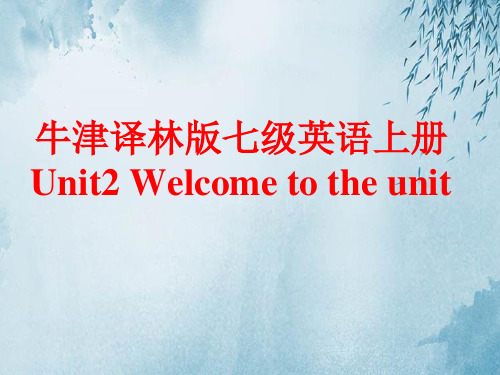
Comic strip
Listen and Answer 1.Does Eddie like any sports?
Yes, he does. 2.What’s his favourite sport?
He likes walking. 3.What does he really like doing ?
She is good at _p_la_y_i_n_g_t_e_n_n_is__. on the tennis court
Which sport are they good at ?
They are good at _p_la_y_i_n_g_v_o_l_le_y_b_a_l_l _. on the volleyball court
牛津译林版七级英语上册 Unit2 Welcome to the unit
Unit2 Let’s play sports! Welco do they like /love/enjoy …?
They like playing badminton.
He is good at playing ___f_o_o_tb_a_l_l _. on the football field
Which sport is Sun Yang good at ?
He is good at __s_w_i_m_m__in_g___. in the swimming pool
A: Hello! My name is … B: Hello! I am… A: I like…What sport do you like/love/enjoy? B: I like … A: Who do you often play/go with? B: I often play/go …with … A: When do you often play/go…? B: I play/go it … A: … Where do you often play/go? B:I often… A: Great! /Good!
新牛津译林版七年级上册Unit8Let's celebrate!课本句型知识点

Unit 8 Let’s celebrate! Welcome to the unit·知识详解1 What’s your favourite festival, Millie 米莉, 你最喜欢什么节日(教材P93)Point What's one's favourite... 某人最喜欢的……是什么讲该句型用于询问某人最喜欢的人或事物,相当于“What…do/does+sb.+like best ”。
回答时可以用` favourite...+be+...”“...+be+one's favourite.”或“主语+like/love... (best) .”, 也可以直接说出最喜欢的人或事物。
—What's her favourite fruit (=What fruit does she like best )她最喜欢的水果是什么—Her favourite fruit is strawberries.她最喜欢的水果是草莓。
—What's your favourite season 你最喜欢的季节是什么—Winter. I can make a snowman.冬季。
我可以堆雪人。
(黄冈中考)2 Many people think it's a festival to remember a great poet,Qu Yuan.许多人认为这是一个纪念伟大诗人屈原的节日。
(教材P93) Point remember /rI'memb (r)/ v.纪念;记住高频讲(1) [及物动词]纪念;缅怀We remember our dead relatives during the QingmingFestival.我们在清明节缅怀死去的亲人。
(2) [及物动词]记住Remember that you may feel sleepy after taking the medicine.记住,吃了这药之后,你可能会犯困。
《Welcome to the unit》 教学设计
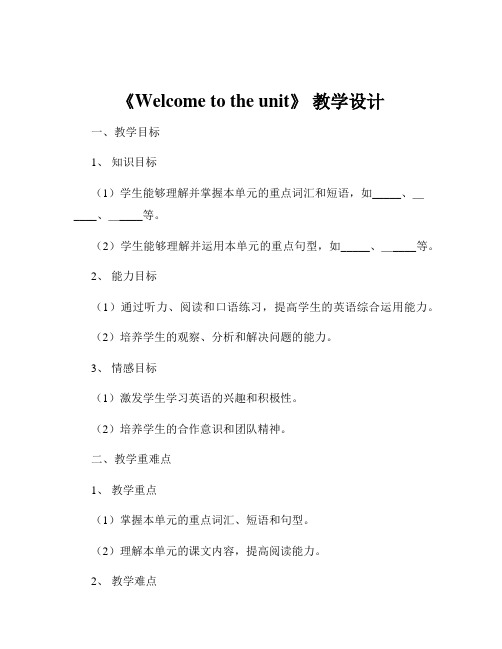
《Welcome to the unit》教学设计一、教学目标1、知识目标(1)学生能够理解并掌握本单元的重点词汇和短语,如_____、_____、_____等。
(2)学生能够理解并运用本单元的重点句型,如_____、_____等。
2、能力目标(1)通过听力、阅读和口语练习,提高学生的英语综合运用能力。
(2)培养学生的观察、分析和解决问题的能力。
3、情感目标(1)激发学生学习英语的兴趣和积极性。
(2)培养学生的合作意识和团队精神。
二、教学重难点1、教学重点(1)掌握本单元的重点词汇、短语和句型。
(2)理解本单元的课文内容,提高阅读能力。
2、教学难点(1)能够正确运用所学的词汇、短语和句型进行交流和表达。
(2)培养学生的跨文化交际意识和能力。
三、教学方法1、情景教学法通过创设生动有趣的情景,让学生在实际情境中学习和运用英语。
2、任务驱动法布置各种任务,让学生在完成任务的过程中提高英语能力。
3、合作学习法组织学生进行小组合作学习,培养学生的合作意识和团队精神。
四、教学过程1、导入(Warmingup)(1)播放一段与本单元主题相关的英语视频或歌曲,引起学生的兴趣,营造英语学习氛围。
(2)展示一些与本单元主题相关的图片,让学生猜测主题,并引导学生用英语进行简单的描述。
2、词汇学习(Vocabulary Learning)(1)通过图片、实物、动作等方式呈现本单元的重点词汇,让学生直观地理解词汇的含义。
(2)带领学生朗读词汇,纠正发音,然后让学生进行拼写练习。
(3)运用词汇进行简单的造句练习,巩固学生对词汇的理解和运用。
3、句型学习(Sentence Pattern Learning)(1)呈现本单元的重点句型,讲解句型的结构和用法。
(2)创设情境,让学生模仿句型进行对话练习,培养学生的口语表达能力。
4、听力训练(Listening Practice)(1)播放本单元的听力材料,让学生听一遍,了解大意。
《Welcome to the unit》 导学案
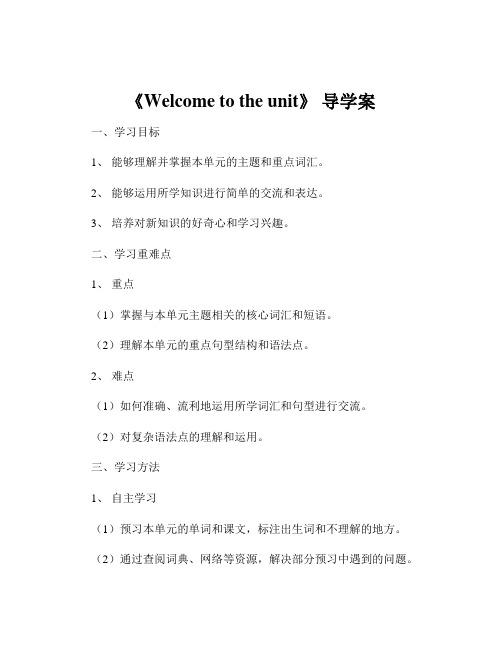
《Welcome to the unit》导学案一、学习目标1、能够理解并掌握本单元的主题和重点词汇。
2、能够运用所学知识进行简单的交流和表达。
3、培养对新知识的好奇心和学习兴趣。
二、学习重难点1、重点(1)掌握与本单元主题相关的核心词汇和短语。
(2)理解本单元的重点句型结构和语法点。
2、难点(1)如何准确、流利地运用所学词汇和句型进行交流。
(2)对复杂语法点的理解和运用。
三、学习方法1、自主学习(1)预习本单元的单词和课文,标注出生词和不理解的地方。
(2)通过查阅词典、网络等资源,解决部分预习中遇到的问题。
2、合作学习(1)与同学组成小组,互相讨论预习中遇到的难题。
(2)共同完成老师布置的小组任务,如对话练习、情景模拟等。
3、课堂学习(1)认真听讲,做好笔记,积极参与课堂互动。
(2)及时向老师请教不懂的问题。
四、知识梳理1、词汇(1)列举本单元的重点词汇,如:_____ 、_____ 、_____ 等,并给出其词性、词义和常见搭配。
(2)通过例句帮助理解词汇的用法。
2、句型(1)呈现本单元的重点句型,如:“_____” 、“_____” 等。
(2)分析句型结构,讲解其使用场景和注意事项。
(3)提供相关的练习,让学生进行句型的操练。
3、语法(1)介绍本单元涉及的主要语法点,如:_____ 。
(2)结合具体例子,详细讲解语法规则和用法。
(3)安排适量的语法练习题,巩固所学知识。
五、课堂活动1、导入通过展示与本单元主题相关的图片、视频或故事,引起学生的兴趣,导入新课。
2、小组讨论组织学生分组讨论与本单元主题相关的问题,鼓励学生积极发表自己的观点和想法。
3、角色扮演让学生根据给定的情景,运用所学知识进行角色扮演,提高语言运用能力。
4、课堂练习布置课堂练习,及时检查学生对知识的掌握情况,针对学生的错误进行讲解和纠正。
六、课后作业1、完成课本上的相关练习题。
2、背诵本单元的重点单词和句型。
3、运用所学知识,写一篇与本单元主题相关的短文。
Unit 2 Welcome to the unit 课件

My father goes fishing every week. My sister takes her dancing lessons twice a week.
help sb (to) do sth help sb with sth 帮助某人做某事 eg. She helps me clean the room. Please help me with the housework.
Part C
What hobbies do your family members or your friends have? Talk with your partners with the following useful phrases.
What’s your father’s/mother’s favourite hobby?
七上U2
Guess: What’s my favourite hobby?
My favourite hobby is playing tennis.
动名词形式
Ms. Qin’s hobby is playing tennis.
A:What’s your favourite hobby? B:My hobby is ...
hobbies. ●*3. Dictation: Part B .
He/She likes... and...
How often does he /she...?
Every week/Twice a week/....
What about your father/mother/...?
Homework
初一英语课件Welcome to the unit

They are from Helping Hands Club
Did you do these before
?
Task 4 What can we do to help others?
Our class will do something for our school and this city. Can you give me some good ideas?
fly
fly in the sky
fly a kite
fly to Beijing
fly - flew
Be quick. Be quiet. Don’t be late. Don’t be careless.
careful
carefully
can’t cannot
See understand
Task 3 How to help others
If you are free, what can you do to make our world more beautiful?
Planting trees can make our city more beautiful.
on the bus
give a seat to someone on the bus
Did you give seats to others before?
Giving a seat to others on the bus is polite. It is polite to give a seat to others on the bus.
in the park clean up the park 清理干净
a man of great ability.
- 1、下载文档前请自行甄别文档内容的完整性,平台不提供额外的编辑、内容补充、找答案等附加服务。
- 2、"仅部分预览"的文档,不可在线预览部分如存在完整性等问题,可反馈申请退款(可完整预览的文档不适用该条件!)。
- 3、如文档侵犯您的权益,请联系客服反馈,我们会尽快为您处理(人工客服工作时间:9:00-18:30)。
Picture 1
Where are the two girls? What are they doing there? How long do they spend speaking to each other? What does “Friends are thieves of time.” mean?
When I’m crying, I think friendship is a white handkerchief. It can wipe my tears away.
What is friendship?
When I am sad, I think friendship is warm sunshine. It can bring me happiness again. When I am in trouble, I think friendship is a strong hand. It can help me escape my troubles.
I think a friend should be …. I want an … man to be my friend.
A good friend is someone who makes me ….
What is friendship?
When it rains, I think friendship is a small umbrella. It can give me a patch of clear sky.
Friends --- their value We need friends because we want to share. We need friends because we need somebody who will be there with us when we fall into bad time. We need friends because we want to enjoy being in a group.
“All the splendor in the world is not worth a good friend.” ---Voltaire, French thinker
人世间所有的荣华富贵不如一个 好朋友。 ---法国思想家伏尔泰
Competition
Who can translate the proverbs about friendship? THINK IT 1. 多个朋友多条路。 OVER 2. 千金易
What do we use a mirror for? What’s the girl on the left doing? Do you think the girl on the right is a good friend? Why? What does “The best mirror is an old friend” mean?
4. 患难朋友才是真朋友。 5. 得朋友难,失朋友易。 6. 没有朋友的生活犹如没有了太阳。 7. 背后说好话才是真朋友。 8. 人无完人。/ 没有缺点的朋友永远 也找不到。
1. Write a composition about why you need friends. 2. Prepare the Reading part.
We hate loneliness and family alone cannot make us feel in a group. For that we need friends. We need friends, because we want to let somebody know about our deepest thoughts, our ideas, and our real emotions. Only a good friend can help us share all these.
Picture 3
What’s the taller boy doing? Why? Should the shorter boy take the money? Why? What’s the base of a good friendship?
Picture 4
Should friends be the same age and share the same hobbies and interests?
Which do you think is the most important one?
What is a friend?
“Friends are the sunshine of life.” ——John Hay
“A friend is one who believes in you when you have ceased to believe in yourself.” ——Lysha
Friendship Quote
“Friendship is the golden ribbon that ties the world together.” ——Kristina Kentigian
What is friendship?
*When I sit in a quiet place, I think friendship is a very wonderful feeling. *It can’t be pulled or torn, because it is in everyone’s heart. *It is there from the beginning to the end of our lives.
Possible answers
1. One more friend, one more way. 2. It’s easier to get quantities of treasure than a real friend. 3. Depend on parents at home and depend on friends outside.
What do you think are the most important characteristics in a friend?
brave
helpful humorous
kind
honest
generous
friends
clever
hard-working
The qualities of a person who can be a friend of others easily:
4. A friend in need is a friend indeed. 5. A friend is easier lost than found. 6. A life without a friend is a life without a sun. 7. He is a good friend that speaks well of us behind our backs. 8. A friend without fault can never be found.
F R I E N D S H I P
forgiving, fair, forever, faithful, friendly… real, responsible, reliable, respectful… important, interesting… enjoyable, everlasting, equal, encouraging… nice… devoted, different… sincere, sharing… helpful, honest… independent… pure, polite, precious, patient, punctual…
Reasons I need friends:
to cope/deal with stressful situations in life to share my worries and secrets in my inner world
to show my concern for other people to let other people share my happiness to unfold to other people the secrets in my heart
The qualities of a person who cannot be a friend of others easily:
selfish, tricky, dishonest, bad-
tempered, mean, impatient, narrowminded, noisy, lazy, gossipy…
